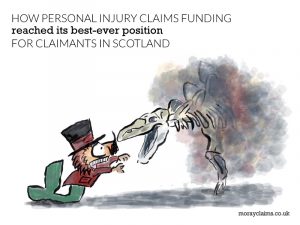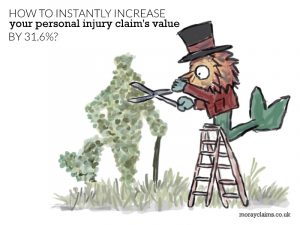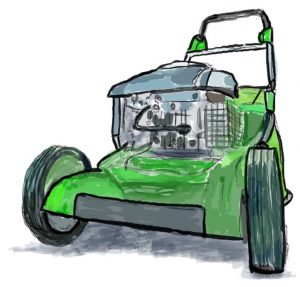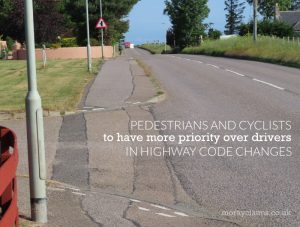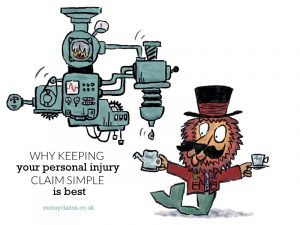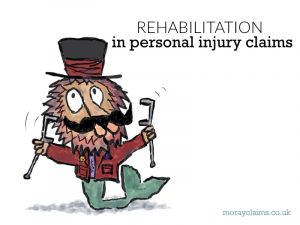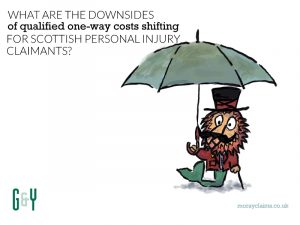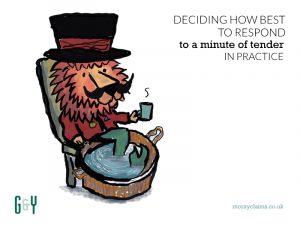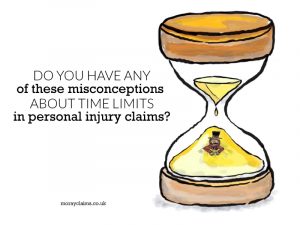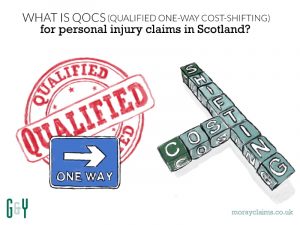In jokes, lawyers are never portrayed as the cream of society. Musicians like to make jokes about each other. Drummers and viola players are a bit dim; accordionists and banjo players are downright annoying (because their instruments are 'loud' and drown out others nearby). Here are a couple of cartoon-based jokes where lawyers and banjo players are on opposite sides. (A) Lawyer (probably a lawyer rather just a "businessman" - because his discomfort is doubly delicious) in a lift (elevator), talking on his mobile phone: "I'm trapped in an elevator. Wait it gets worse..." (The other occupant of the lift is a banjo player). It works better in the original... (B) Father to young child who is holding a banjo and standing on a chair to be high enough to see the music on their music stand: "Certainly a law degree is a worthwhile endeavour, son, but you need something to fall back on. Now practise your banjo." (Lawyers' response: Ouch). You wouldn't necessarily expect to be Continue Reading
How to instantly increase the value of your personal injury claim by 25%?
The comic strip featuring Calvin and Hobbes has many recurring themes. For example, the opinion poll results showing that Calvin's Dad risks failing to be "re-elected" as Calvin's Dad in upcoming elections (elections which never seem to materialise). Calvin: (e.g.) "You rate especially low among tigers and six-year-old white males." Calvin's Dad: (e.g.) "I take comfort in the fact that not many people would want the job (i.e. the job of being "Calvin's Dad")." Another recurring theme is Calvin's fear of maths problems. It does not help that Hobbes (his pet, stuffed tiger) helps him in class and with homework. For example, Calvin: "What's 7 + 3?" Hobbes: "73." In one class quiz, Calvin considers the following problem: "Jack and Joe leave their homes at the same time and drive toward each other. Jack drives at 60 mph, while Joe drives at 30 mph. They pass each other in 10 minutes. How far apart were Jack and Joe when they started?" Calvin stares helplessly at the Continue Reading
How an “off” petrol lawnmower can still be a powered-blade injury risk
Imagine you've been cutting grass with a self-propelled rotary petrol mower - like the ones shown in various images in this article. (You don't 'push' such lawnmowers. They are propelled along by their engines). You stop the engine to adjust the height of the blade. While you're doing that, completely without warning and unexpectedly, the motor restarts of its own accord. The blade spins into action and you suffer serious injury to your hand as a result. Statistics from the USA show that there was an average of about 85,000 lawnmower-related injuries annually in the period 2005 to 2015. The most commonly injured body parts were the hand/finger (22%) followed by the lower extremities (i.e. toes) (16%). Men were more than 3 times as likely to be injured as women. The annual number of lawnmower-related injuries showed no decrease during the period 2005 to 2015. The purpose of this article is to highlight a particular risk associated with petrol-driven Continue Reading
Pedestrians and cyclists to have more priority over drivers in Highway Code changes
Walking and cycling have become more popular during the pandemic. So-called “active travel” has benefits for personal health as well as the environment. Department for Transport figures show that, over the last year, there’s been a 46% increase in the number of miles cycled on British roads. Tellingly, that’s a larger increase than in all of the previous 20 years combined. To take even one corner of Moray as an example... While the Lossiemouth - Elgin cycle path beside the A941 has been an active travel benefit for many years, the long-mooted track to connect Lossiemouth to Hopeman has only recently gained significant traction, despite years of campaigning. Now that the charitable organisation (SCIO) Laich of Moray Active Travel Routes is in existence, and with help from Sustrans, a connection between Lossiemouth and Covesea is coming. Hopefully, the final link from Covesea to Hopeman - to cover places such as the Green Road, Gordonstoun and Duffus - will not be far Continue Reading
Why it’s worth knowing about Cauda Equina Syndrome
Cauda equina syndrome (“CES”) is a medical emergency. Any delay in diagnosis and treatment of CES can result in life-changing physical disability and psychological injury. What is cauda equina syndrome (CES) exactly? CES is an uncommon but serious neurological condition. It is caused by compression (i.e. squeezing) of a bundle of nerve roots at the base of the spinal column. Cauda is Latin for tail and equina is Latin for horse (ie, the "horse's tail"). The seat of the problem is around where your tail would connect to your body, if you had a tail. The ‘cauda equina’ nerves provide feeling to, and enable control of, the bowel, bladder, anal and genital areas. Also, the legs and feet. So it all sounds quite crucial, doesn't it? Compression of these nerves - say, as a result of a slipped disc or lower back injury - puts the injured person at risk of permanent disability. Someone with suspected cauda equina must be referred for urgent assessment. Typically, this Continue Reading
Why keeping your personal injury claim simple (or as simple as possible) is best
“You’re ignorant. But at least you act on it.” So comments an eye-rolling Hobbes to Calvin in response to his friend’s rant about knowledge only leading to paralysis by analysis. That’s an outcome which, as a “man of action”, Calvin simply cannot afford. In other words, it’s a "simple" explanation for why Calvin will be better off not doing his homework. Calvin’s logic may be flawed but, with a personal injury claim, the simplest approach is usually the best. But can we keep things simple? In this article, we’ll consider, firstly, some of the factors that can complicate a personal injury claim. Secondly, we’ll look at complexity from the injured claimant’s perspective. And finally at “control” issues surrounding complexity: in other words, who has the power to make things simple or not? There are lots of ways a personal injury claim can become complicated. That's not a complete list by any means but it gives you a few examples of areas where complexity can Continue Reading
Rehabilitation in Personal Injury Claims
Personal injury compensation claims are about money. The purpose of the process is to put you, the injured person, back in the same position you would have been in if the accident had not happened. At least, as far as that is possible through money alone. We know from research that, in many cases, rehabilitation can help injured people recover more quickly, improve their quality of life and get them back to work more quickly. This means that rehabilitation can be a key factor in getting an injured person back to the state they would have been in were it not for the accident. Where rehabilitation has to be paid for, the cost can generally be recovered as part of your compensation, provided it is reasonable. When is rehabilitation appropriate? It can be helpful in relation to both physical and psychological injuries. If you have a whiplash injury, you may benefit from a course of physiotherapy. In more serious cases, for example, involving loss of a limb, rehabilitation may include the Continue Reading
What are the downsides of QOCS for Scottish personal injury claimants?
We've talked about Qualified One-Way Costs Shifting (QOCS) before now because it is an important topic. In Scotland, the "normal rule" whereby an unsuccessful claimant for personal injury compensation will no longer have to pay court costs / expenses if the claim fails will have various exceptions. In these situations, the claimant will lose QOCS protection and have to pay the costs of their opponent. The claimant will only be liable for their opponent's expenses in Scotland where they have: We have waited three years for the QOCS regulations to come in. They were enacted from 30 June 2021. In many respects, the regulations mirror those already in force in England and Wales. The basic principle is the same and the exceptions are largely the same. Abuse of process, behaving manifestly unreasonably and also acting fraudulently or making a fraudulent misrepresentation. One big difference is that Scotland has not enacted any equivalent concept to England and Continue Reading
Help From The Other Driver’s Insurer (How To Avoid Being Misled)
An "innocent third party car claim" is how some motor insurers describe what you have if one of their customers has crashed into your vehicle and it’s not your fault. In other words, the motor insurers in question are the third-party insurers, not your own motor insurers. Their customer was to blame for the accident. The third-party insurers’ offer to you is that you should let them take care of you and your vehicle in sorting things out. This help from the other driver's insurer can include: the repair of your vehicle (or a payment to represent its value if it has been written off), use of a hire vehicle, free of charge, while your own vehicle is being repaired; and help if you have been injured – to include treatment/rehabilitation and compensation. But couldn't you deal through your own insurers? If you have comprehensive motor insurance, one of your options is to deal with a claim for damage to your car through your own motor insurers. This can be an involved process. You may Continue Reading
Deciding how best to respond to a Minute of Tender in practice
Tea drinking is a national pastime in Nepal. They have all sorts of teas - sweet, butter, hot, cold, black, white. The ritual with tea is that, when offered tea, you decline it and your host insists that you have some. No matter how much you say no, they still insist that you have it. So you drink it. In other words, it's a situation with drink consumption where "no" means "yes". With personal injury court actions, as the claimant, if your opponent offers you settlement via a Minute of Tender, you want to say "no" (because you always want them to make you a better offer). Unfortunately, you might find that however much you say "no", depending on the level of offer, your legal adviser may have to insist that you say "yes" and accept it. It's one of the situations that can happen with Minutes of Tender. You think your personal injury claim’s worth £20,000 but you’ve got a formal offer (Minute of Tender) in your court action to settle at £10,000. Should you accept the Continue Reading
Do you have any of these misconceptions about time limits in personal injury claims?
“The room is full of steam from the kettle but you still make the tea.” These were words of my school chemistry teacher. What was the point? That a small volume of water produces a large volume of steam. If you put water on to boil for a cup of tea but then get distracted by something else, you may return to find the room filled with steam but there will probably still be enough water left to make your brew. This idea that you can forget about something for a while, come back to it and the outcome will still be okay seems to be one that many folk with possible personal injury compensation claims have too. The problem is that personal injury claims are up against a hard deadline. In most cases, that deadline is 3 years from the date of the accident/injury. If you don’t settle your claim by negotiation within the 3-year period, you’ll have to raise a court action to keep the claim alive beyond the deadline - or lose the right to claim forever. It’s inevitable Continue Reading
What’s qualified one-way cost-shifting for personal injury claims in Scotland?
"Give me 10 men like Clouseau and I could destroy the world," These were the words of Chief Inspector Charles Dreyfus (Herbert Lom), long-suffering superior of the hilariously inept Inspector Jacques Clouseau (Peter Sellers) in the Pink Panther films of the 1960s and 70s. Another crucial supporting role to Clouseau was that of Cato Fong (Burt Kwouk – pronounced “Kwok”), the Inspector’s Chinese manservant, trained to spring regular surprise attacks on his boss to keep him alert and practised in martial arts. A prime example of Clouseau’s extreme destructive power is in one apartment scene where, with Cato’s assistance, he destroys not only a four-poster bed and a TV set but also inflicts structural damage on the flat below, occupied by the hysterically twitching Dreyfus. We could say that Burt Kwouk’s role was crucial in support of Peter Sellers’ performance. And, because we love a pun, we could also say that, in the context of personal injury claims, QOCS (which is Continue Reading
